Time Person of the Year
man, woman or idea that "most influenced events in the preceding year" chosen by Time magazine From Wikipedia, the free encyclopedia
Person of the Year is a special issue of the American magazine Time. It has been published each year since 1927. Until 1999, it was called "Man of the Year."[1]

The "Person of the Year" is not always a person. It can be a person, group, idea, or thing that "for better or for worse...has done the most to influence the events of the year".[2] This means that being chosen is not an award, like being chosen as the "best person of the year." The Person of the Year may be an enemy of the United States, like Adolf Hitler (1938) or Joseph Stalin (1939 and 1942).[3] Every year, Time chooses the person who they think has had the most effect on the things that have happened in that year (whether those things were good or bad).[4]
The first Man of the Year was aviator Charles Lindbergh, in 1927. Since then, Persons of the Year have included groups, whole generations, important objects, and even the Earth. Since the list began, every serving President of the United States has been a Person of the Year at least once, except for Calvin Coolidge, Herbert Hoover, and Gerald Ford. Franklin D. Roosevelt is the only person to have been named Person of the Year three times.
The December 31, 1999 issue of Time named Albert Einstein the "Person of the Century". Franklin D. Roosevelt and Mahatma Gandhi were chosen as runners-up.[5]
Persons of the Year
| Year | Image | Choice | Lifetime | Notes | Runners-up |
|---|---|---|---|---|---|
| 1927 | 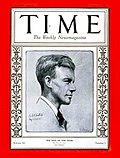 |
Charles Lindbergh | 1902–1974 | Lindbergh completed the first solo transatlantic flight in May 1927 by piloting his monoplane Spirit of St. Louis from Garden City, New York to Paris, France. | |
| 1928 |  |
Walter Chrysler | 1875–1940 | In 1928, Chrysler oversaw a merger of his company, Chrysler, with Dodge before beginning work on the Chrysler Building. | |
| 1929 |  |
Owen D. Young | 1874–1962 | Young chaired a committee which authored 1929's Young Plan, a program for settlement of German reparations after World War I. | |
| 1930 |  |
Mahatma Gandhi | 1869–1948 | Gandhi was the leader of India's independence movement. In 1930, he led the Salt Satyagraha, a 240-mile march to protest the imposition of taxes on salt by the British Raj. | |
| 1931 |  |
Pierre Laval | 1883–1945 | Laval was first appointed Prime Minister of France in 1931. He was popular in the American press at the time for opposing the Hoover Moratorium, a temporary freeze on World War I debt payments that was disliked in both France and the US.[6] | |
| 1932 |  |
Franklin D. Roosevelt | 1882–1945 | Roosevelt won the 1932 US presidential election by a landslide, defeating the incumbent, Herbert Hoover. | |
| 1933 |  |
Hugh S. Johnson | 1882–1942 | In 1933, Johnson was appointed director of the National Recovery Administration. US President Franklin D. Roosevelt gave him the task of bringing industry, labor and government together to create codes of "fair practices" and set prices. | |
| 1934 |  |
Franklin D. Roosevelt (2) | 1882–1945 | Roosevelt was President of the United States from 1933 to 1945. In 1934, Roosevelt's New Deal reforms were beginning to bring results. | |
| 1935 |  |
Haile Selassie | 1892–1975 | Selassie was Emperor of Ethiopia in 1935, when Italian forces invaded Ethiopia, starting the Second Italo-Abyssinian War. | |
| 1936 | 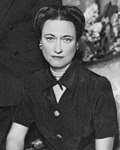 |
Wallis Simpson | 1896–1986 | In 1936, Simpson's relationship with King Edward VIII of the United Kingdom led the king to abdicate the throne to marry her. | |
| 1937 |  |
Chiang Kai-shek | 1887–1975 | Chiang was Premier of the Republic of China at the outbreak of the Second Sino-Japanese War in 1937. | |
 |
Soong Mei-ling | 1898–2003 | Soong was wife of Chiang Kai-shek from 1927 until his death in 1975, and was active in rallying support for the Republic of China in the US. Addressed as Madame Chiang Kai-Shek by the magazine, she was recognized together with her husband as "Man & Wife of the Year".[7] | ||
| 1938 |  |
Adolf Hitler | 1889–1945 | As Chancellor of Germany, Hitler oversaw the unification of Germany with Austria and the Sudetenland in 1938, after the Anschluss and Munich Agreement respectively. Instead of a conventional portrait, the cover was an illustration by Rudolph von Ripper entitled 'From the unholy organist, a hymn of hate'.[8] | |
| 1939 |  |
Joseph Stalin | 1878–1953 | In 1939, Stalin was General Secretary of the Communist Party of the Soviet Union and Premier of the Soviet Union. He oversaw the signing of a non-aggression pact with Nazi Germany before invading eastern Poland. | |
| 1940 |  |
Winston Churchill | 1874–1965 | Churchill was Prime Minister of the United Kingdom during the Dunkirk evacuation and the Battle of Britain. | |
| 1941 |  |
Franklin D. Roosevelt (3) | 1882–1945 | Roosevelt was President of the United States in 1941 during the attack on Pearl Harbor, declaration of war against Japan and resulting entry of the United States into World War II. The editors had already chosen Dumbo as their "Mammal of the Year" before the Pearl Harbor attack, but quickly changed it to Roosevelt.[9] | |
| 1942 |  |
Joseph Stalin (2) | 1878–1953 | By 1942, Stalin was General Secretary of the Communist Party of the Soviet Union and Premier of the Soviet Union, overseeing the Battle of Stalingrad (1942–1943). | |
| 1943 |  |
George C. Marshall | 1880–1959 | As United States Army Chief of Staff in 1943, General Marshall was instrumental in organizing US actions in World War II. | |
| 1944 |  |
Dwight D. Eisenhower | 1890–1969 | General Eisenhower was Supreme Allied Commander in Europe during 1944's Operation Overlord. | |
| 1945 | 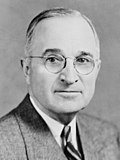 |
Harry S. Truman | 1884–1972 | Truman became President of the United States after the death of Franklin D. Roosevelt in 1945, authorizing the atomic bombings of Hiroshima and Nagasaki. | |
| 1946 |  |
James F. Byrnes | 1882–1972 | In 1946, Byrnes was United States Secretary of State during the Iran crisis of 1946, taking an increasingly hardline position in opposition to Stalin. His speech, "Restatement of Policy on Germany", set the tone of future US policy, repudiating the Morgenthau Plan economic policies and giving Germans hope for the future. | |
| 1947 |  |
George C. Marshall (2) | 1880–1959 | Appointed United States Secretary of State in 1947, Marshall was the architect of the Marshall Plan. | |
| 1948 | 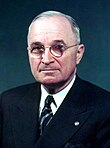 |
Harry S. Truman (2) | 1884–1972 | Truman was elected in his own right as President of the United States in 1948, which is considered to be one of the greatest election upsets in American history.[10][11][12] | |
| 1949 |  |
Winston Churchill (2) | 1874–1965 | Proclaimed as the "Man of the half-century", Churchill had led Britain and the Allies to victory in WWII. In 1949, Churchill was Leader of the Opposition. | |
| 1950 |  |
The American fighting-man | Representing US troops involved in the Korean War (1950–1953) | ||
| 1951 |  |
Mohammad Mossadegh | 1882–1967 | In 1951, Mossadegh was appointed Prime Minister of Iran and expelled western oil companies, starting the Abadan Crisis. | |
| 1952 |  |
Elizabeth II | 1926–2022 | In 1952, Elizabeth acceded to the throne of the United Kingdom and the other Commonwealth realms upon the death of her father, King George VI. | |
| 1953 |  |
Konrad Adenauer | 1876–1967 | In 1953, Adenauer was re-elected as Chancellor of West Germany. Adenauer was overseeing the reconstruction of Germany and the Economic Miracle, had successfully restored relations with Germany's wartime enemies in the West, and was working towards European integration.[13] | |
| 1954 | 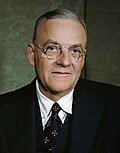 |
John Foster Dulles | 1888–1959 | As United States Secretary of State in 1954, Dulles was architect of the Southeast Asia Treaty Organization. | |
| 1955 |  |
Harlow Curtice | 1893–1962 | Curtice was President of General Motors (GM) from 1953 to 1958. In 1955, GM sold five million vehicles and became the first corporation to earn US$1 billion in a single year.[14] | |
| 1956 |  |
The Hungarian freedom fighter | Representing Hungarian revolutionaries involved in the 1956 uprising against the Soviet-dominated government, which was put down by the Soviet Army | ||
| 1957 |  |
Nikita Khrushchev | 1894–1971 | In 1957, Khrushchev consolidated his leadership of the Soviet Union, surviving a plot to dismiss him by Stalinist members within the Presidium, and leading the Soviet Union into the Space Race with the launch of Sputnik 1. | |
| 1958 |  |
Charles de Gaulle | 1890–1970 | De Gaulle was appointed Prime Minister of France in May 1958 and, following the collapse of the Fourth Republic and establishment of the Fifth Republic, was then elected as President of France in December. | |
| 1959 |  |
Dwight D. Eisenhower (2) | 1890–1969 | Eisenhower was President of the United States from 1953 to 1961. In 1959, Eisenhower arranged the state visit by Nikita Khrushchev to the United States and toured several countries, becoming the first US president to visit India.[15] | |
| 1960 |  |
U.S. Scientists | Time claimed in 1960 "science is at the apogee of its power for good or evil", although it noted that "the 15 men [on the cover] include two or three whose greatest work is probably behind them".
The cover and piece spotlights the following scientists:
| ||
| 1961 |  |
John F. Kennedy | 1917–1963 | Kennedy was inaugurated as President of the United States in 1961, ordering the failed invasion of Cuba by U.S.-trained Cuban exiles. | |
| 1962 |  |
John XXIII | 1881–1963 | Pope of the Roman Catholic Church from 1958 to 1963. In 1962, he volunteered as a mediator in the Cuban Missile Crisis between the U.S. and USSR, gaining praise from both sides. He also initiated the Second Vatican Council that same year. | |
| 1963 | 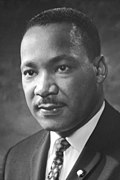 |
Martin Luther King Jr. | 1929–1968 | A leader of the American Civil rights movement, King delivered his famous "I Have a Dream" speech in 1963. | |
| 1964 |  |
Lyndon B. Johnson | 1908–1973 | Johnson was elected in his own right as President of the United States in 1964, before securing the passage of the Civil Rights Act, declaring a War on poverty, and escalating US involvement in the Vietnam War. | |
| 1965 |  |
William Westmoreland | 1914–2005 | General Westmoreland was commander of US forces in South Vietnam during the Vietnam War. | |
| 1966 |  |
The Inheritor | Representing a generation of American men and women, aged 25 and under – the Baby Boom generation, who in 1966 made up nearly half the population and were influential both in the counterculture of the 1960s and as drafted soldiers in the Vietnam War. The face most prominently seen on the cover representing the generation was that of Thomas M. McLaughlin.[17][18] | ||
| 1967 |  |
Lyndon B. Johnson (2) | 1908–1973 | Johnson was President of the United States from 1963 to 1969. Time noted that it had been a year of setbacks and failures for Johnson, with race riots across the US, deepening involvement in the Vietnam War, and the Dump Johnson movement within his own party.[19] | |
| 1968 |  |
The Apollo 8 astronauts | Frank Borman: 1928–2023 Jim Lovell: Born 1928 William Anders: 1933–2024 |
In 1968, the American crew of Apollo 8 (William Anders, Frank Borman and Jim Lovell) became the first humans to travel beyond low Earth orbit, orbiting the Moon and paving the way for the first human Moon landings in 1969. | |
| 1969 |  |
The Middle Americans | Conservative, small-town Americans, also referred to as the silent majority. Time saw Middle America as the driving force behind Richard Nixon's 1968 election win, the background of the American astronauts of Apollo 11, and the conservative side of debates on social issues such as school desegregation, prayer in public schools, sex education and drugs policy.[20][21] | ||
| 1970 |  |
Willy Brandt | 1913–1992 | As Chancellor of West Germany, Brandt was acknowledged for "seeking to bring about a fresh relationship between East and West" through his "bold approach to the Soviet Union and the East Bloc". In 1970, Brandt renounced German claims on Poland and recognized East Germany, and acknowledged the Holocaust in Nazi-occupied Poland with the symbolic Kniefall von Warschau.[22] | |
| 1971 |  |
Richard Nixon | 1913–1994 | Nixon was President of the United States from 1969 to 1974. In 1971, Nixon had withdrawn the US dollar from the gold standard, triggering the Nixon shock, created the Economic Stabilization Program, and re-opened relations with communist China.[23] | |
| 1972 |  |
Richard Nixon (2) | 1913–1994 | As President of the United States, Nixon visited China in 1972, the first U.S. president to do so. Nixon later secured the SALT I pact with the Soviet Union before being re-elected in one of the largest landslide election victories in American history. | |
 |
Henry Kissinger | 1923–2023 | Kissinger, as Nixon's National Security Advisor, traveled with the President to China in 1972, and was negotiating peace in the Vietnam War. | ||
| 1973 |  |
John Sirica | 1904–1992 | In 1973, as Chief Judge of the United States District Court for the District of Columbia, Sirica ordered President Nixon to turn over Watergate-related recordings of White House conversations. | |
| 1974 |  |
Faisal | 1906–1975 | Faisal, King of Saudi Arabia, was acknowledged in the wake of the oil crisis of 1973–1974, caused by Saudi Arabia withdrawing its oil from world markets in protest at Western support for Israel during the Yom Kippur War. | |
| 1975 |  |
American women | Highlighting the successes of the American feminist movement and "the status of the everyday, usually anonymous woman, who moved into the mainstream of jobs, ideas and policy making".
The cover and piece spotlights the following women:
|
||
| 1976 | 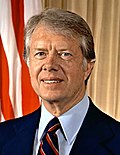 |
Jimmy Carter | Born 1924 | In 1976, Carter was elected President of the United States, defeating incumbent President Gerald Ford. | |
| 1977 |  |
Anwar Sadat | 1918–1981 | Sadat, as President of Egypt, traveled to Israel in 1977—the first Arab leader to do so—to discuss normalization of Egypt–Israel relations. | |
| 1978 |  |
Deng Xiaoping | 1904–1997 | Deng, as Vice Premier, overthrew Hua Guofeng to assume de facto control over China in 1978, as Paramount leader. | 4
|
| 1979 |  |
Ruhollah Khomeini | 1902–1989 | Khomeini led the 1979 Iranian Revolution, establishing himself as Supreme Leader. | 4
|
| 1980 |  |
Ronald Reagan | 1911–2004 | Reagan was elected President of the United States in 1980, defeating incumbent President Jimmy Carter. | |
| 1981 |  |
Lech Wałęsa | Born 1943 | Leader of the Polish Solidarity trade union and architect of the Gdańsk Agreement until his arrest by the communist authorities and the imposition of martial law in Poland in December 1981 | 4
|
| 1982 |  |
The Computer | Denoted "Machine of the Year" to herald the dawn of the Information Age
The feature spotlights the following people, in order:
|
||
| 1983 |  |
Ronald Reagan (2) | 1911–2004 | In 1983, as President of the United States, Reagan ordered the invasion of Grenada and championed the Strategic Defense Initiative. | 4
|
 |
Yuri Andropov | 1914–1984 | Andropov, as General Secretary of the Communist Party of the Soviet Union, was a critic of the Strategic Defense Initiative and tried to revive stagnating Soviet economy. Andropov was hospitalized in August 1983 and died in 1984. | ||
| 1984 |  |
Peter Ueberroth | Born 1937 | Ueberroth orchestrated the organization of the 1984 Summer Olympics, which involved a Soviet-led boycott. | 4
|
| 1985 |  |
Deng Xiaoping (2) | 1904–1997 | As Paramount Leader of China, Deng acknowledged the need for "sweeping economic reforms that have challenged Marxist orthodoxies". In 1985, Deng had lifted price controls and eased the restrictions on private ownership and business.[44] | 4
|
| 1986 |  |
Corazon Aquino | 1933–2009 | Aquino was a prominent figure in 1986's People Power Revolution, being elected president of the Philippines. | |
| 1987 |  |
Mikhail Gorbachev | 1931–2022 | As general secretary of the Communist Party of the Soviet Union and leader of the Soviet Union, Gorbachev oversaw perestroika and glasnost political reforms in 1987, aimed at liberalizing Soviet society. | |
| 1988 |  |
The Endangered Earth | Planet of the Year, representing the growing environmental movement as well as several natural and ecological disasters that struck in 1988: among them were the 1988–1989 North American drought, "syringe tide", 1988 Bangladesh cyclone and 1988 Armenian earthquake, as well as ozone depletion, global warming, radioactive contamination and deforestation.[51] | ||
| 1989 |  |
Mikhail Gorbachev (2) | 1931–2022 | Acknowledged as "Man of the Decade". Gorbachev, as General Secretary of the Communist Party of the Soviet Union (Soviet leader), oversaw 1989's first free Soviet elections in history before the fragmentation of the Eastern Bloc and overthrow of Soviet-dominated communist governments in Eastern Europe. | |
| 1990 | 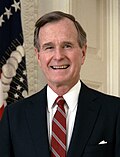 |
George H. W. Bush | 1924–2018 | As President of the United States, Bush oversaw U.S. involvement in the Gulf War (1990–1991). | |
| 1991 |  |
Ted Turner | Born 1938 | Founder of CNN. The piece particularly highlighted CNN's coverage of Operation Desert Storm and the Gulf War, proclaiming it "History as it happens". | |
| 1992 | 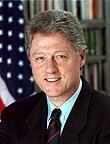 |
Bill Clinton | Born 1946 | Clinton was elected President of the United States in 1992, defeating incumbent President George H. W. Bush. | |
| 1993 |  |
The Peacemakers | Represented by Yasser Arafat, F. W. de Klerk, Nelson Mandela, and Yitzhak Rabin. De Klerk, as State President of South Africa, oversaw Mandela's release from prison in 1990. In 1993, the pair were negotiating the end of the Apartheid system, and had just jointly won the Nobel Peace Prize. Arafat, as President of the Palestinian National Authority, and Rabin, as Prime Minister of Israel, signed the 1993 Oslo Accord, the first face-to-face agreement between Palestinian and Israeli authorities. | ||
| 1994 |  |
John Paul II | 1920–2005 | Pope of the Roman Catholic Church from 1978 to 2005. In 1994, he had been active in several social debates: he released a book-length interview and the English translation of the Catechism of the Catholic Church, ruled out the ordination of women, criticized the promotion of abortion and family planning at the Cairo Conference, and established relations with Israel.[56] | |
| 1995 |  |
Newt Gingrich | Born 1943 | Leader of the "Republican Revolution", a Republican Party election landslide, which led to Gingrich being elected Speaker of the House | |
| 1996 |  |
David Ho | Born 1952 | Ho, a scientist, pioneered much AIDS research. In 1996, he had announced that a medical trial of combination therapy had reduced the viral load in HIV-positive patients to levels too low to be measured, changing the disease profile from terminal to a manageable disease.[57] | |
| 1997 |  |
Andrew Grove | 1936–2016 | In 1997, Grove was chairman and CEO of Intel, recognized as a pioneer in the semiconductor industry and taken as a representative of the Digital Revolution and the tech boom. | 3
|
| 1998 |  |
Bill Clinton (2) | Born 1946 | As President of the United States, Clinton was impeached in 1998 following the Lewinsky scandal. The Senate acquitted him of the charges. | |
 |
Ken Starr | 1946–2022 | Starr, a lawyer investigating various figures within the Clinton administration, published his Starr Report in 1998, opening the door for the impeachment of Bill Clinton. | ||
| 1999 |  |
Jeff Bezos | Born 1964 | Bezos is the founder and was the CEO of Amazon.com, at that point one of the most successful companies in the dot-com boom. | |
| 2000 |  |
George W. Bush | Born 1946 | In 2000, Bush was elected President of the United States, defeating incumbent Vice President Al Gore. | |
| 2001 |  |
Rudy Giuliani | Born 1944 | Giuliani, Mayor of New York City at the time of the September 11 attacks in 2001, was selected as a symbol of America's response to the attacks. | |
| 2002 | The Whistleblowers | Represented by Cynthia Cooper, Coleen Rowley, and Sherron Watkins. In 2001, Watkins uncovered accounting irregularities in the financial reports of Enron, testifying before Congressional committees the following year. In 2002, Cooper exposed a $3.8 billion fraud at WorldCom. At the time, this was the largest incident of accounting fraud in U.S. history. In 2002, Rowley, an FBI agent, gave testimony about the FBI's mishandling of information related to the September 11 attacks of 2001. | |||
| 2003 |  |
The American soldier (2) | Representing U.S. forces around the world, especially in the Iraq War (2003–2011) | ||
| 2004 |  |
George W. Bush (2) | Born 1946 | In 2004, Bush was re-elected President of the United States, defeating John Kerry and overseeing US involvement in the Iraq War. | |
| 2005 |   |
The Good Samaritans | Represented by Bono, Bill Gates, and Melinda Gates. Bono, philanthropist and member of the rock band U2, helped to organize the 2005 Live 8 concerts. Bill Gates, founder of Microsoft and richest person in the world at the time, and his wife Melinda, founded the philanthropic Bill & Melinda Gates Foundation. | ||
| 2006 |  |
You[61] | Representing individual content creators on the World Wide Web | ||
| 2007 |  |
Vladimir Putin[63] | Born 1952 | Putin was President of Russia from 2000 to 2008, and from 2012 onwards. In 2007, it was apparent that Putin's power would continue after his presidential term expired: he had suppressed much of the opposition to his rule, including having a suspected role in the 2006 assassination of Anna Politkovskaya and poisoning of Alexander Litvinenko, and had secured his position as Prime Minister of Russia to his loyalist successor Dmitry Medvedev. | |
| 2008 |  |
Barack Obama[65] | Born 1961 | In 2008, Obama was elected President of the United States, defeating John McCain to become the first African-American President of the United States in January 2009. | 4
|
| 2009 |  |
Ben Bernanke[67] | Born 1953 | Chairman of the Federal Reserve during the financial crisis of 2007–08 and the following Great Recession | 4
|
| 2010 |  |
Mark Zuckerberg[69] | Born 1984 | Founder of the social-networking website Facebook. In 2010, Facebook passed half a billion users but was involved in privacy disputes, and Zuckerberg had been the subject of the Oscar-winning biographical film The Social Network. | |
| 2011 |  |
The Protester[71] | Recognizing the historic significance of many grassroots protests across the world during that year, such as the ongoing Arab Spring and those against austerity measures in Greece and later in Spain, against corruption in India, against the drug war in Mexico, for education in Chile, for social justice in Israel, as well as the riots in England, the anti-government protests in Russia and the emerging global Occupy movement[71] | 4
| |
| 2012 |  |
Barack Obama (2)[73] | Born 1961 | In 2012, Obama was re-elected President of the United States, defeating Mitt Romney. | 4
|
| 2013 |  |
Francis[75] | Born 1936 | Elected Pope of the Roman Catholic Church in 2013, following the resignation of Pope Benedict XVI | |
| 2014 | 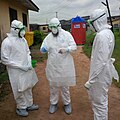 |
Ebola fighters[77] | "Ebola fighters" refers to health care workers who helped stop the spread of the Ebola virus during the Ebola virus epidemic in West Africa, including not only doctors and nurses, but also ambulance attendants, burial parties and others.[78]
Those represented on the covers included
|
4
| |
| 2015 |  |
Angela Merkel | Born 1954 | Chancellor of Germany from 2005 to 2021, recognized for leadership in the Greek debt crisis and European migrant crisis[85] | |
| 2016 |  |
Donald Trump | Born 1946 | In 2016, Trump was elected President of the United States, defeating Hillary Clinton. | |
| 2017 | The Silence Breakers | The people who spoke out against sexual abuse and harassment, including the figureheads of the American MeToo movement. Represented on the cover by strawberry picker Isabel Pascual (pseudonym), lobbyist Adama Iwu, actress Ashley Judd, software engineer Susan Fowler, singer-songwriter Taylor Swift, and a sixth woman, a hospital worker who wished to remain anonymous and whose face cannot be seen.
The feature also specifically spotlights, in order:
|
|||
| 2018 |    |
The Guardians |
Journalists who faced persecution, arrest or murder for their reporting. Those highlighted on four different covers were:
The feature also spotlights the following journalists, in order:
|
||
| 2019 |  |
Greta Thunberg | Born 2003 | Swedish environmental activist and founder of the School Strike for Climate campaign. In 2019, Thunberg led the Global Week for Future with over four million protestors and addressed the 2019 UN Climate Action Summit with her "How Dare You" speech.[113] | |
| 2020 |  |
Joe Biden[115] | Born 1942 | In 2020, Biden and Harris were elected President and Vice President of the United States respectively, defeating incumbent President Donald Trump and Vice President Mike Pence.[116] In January 2021, Harris became the first woman, first African American, and first Asian American vice president. | 3
|
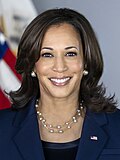 |
Kamala Harris[115] | Born 1964 | |||
| 2021 |  |
Elon Musk[118] | Born 1971 | CEO of Tesla, Inc., founder and CEO of SpaceX. In 2021, Musk had become the richest person in the world and first person reported to have a net worth of over 300 billion US dollars. Recognized for the achievements of stated companies in the prior years, including the first all-civilian orbital flight, as well as his public image and controversies.[119] | Time did not release a shortlist for 2021.[120] |
| 2022 |  |
Volodymyr Zelenskyy[121] | Born 1978 | President of Ukraine since 2019, and supreme commander-in-chief during the 2022 Russian invasion of Ukraine | 9
|
| The Spirit of Ukraine[123] | "The Spirit of Ukraine" represents the "resilience of the Ukrainian people and the Ukrainian resistance, as well as foreign aid to Ukraine".
The feature spotlights the following people and organizations, in order:
| ||||
| 2023 |  |
Taylor Swift | Born 1989 | Singer-songwriter whose 2023–2024 Eras Tour became the highest-grossing concert tour of all time.[124] The tour had a significant cultural and economic impact in 2023. Time described Swift as the first Person of the Year to be recognized for their "achievement in the arts". Swift was also on the 2017 Person of the Year cover, called "The Silence Breakers". She was noted by the magazine as the first woman to appear twice on a Person of the Year cover.[125] | 8
|
| 2024 |  |
Donald Trump (2) | Born 1946 | In 2024, Trump was re-elected President of the United States, defeating incumbent Vice President Kamala Harris and becoming the second president to win two nonconsecutive terms after Grover Cleveland.[126][127] |
References
Wikiwand - on
Seamless Wikipedia browsing. On steroids.

